人教七下unit11知识点归纳及测试
Unit 11 How was your school trip_知识清单及练习(无答案)
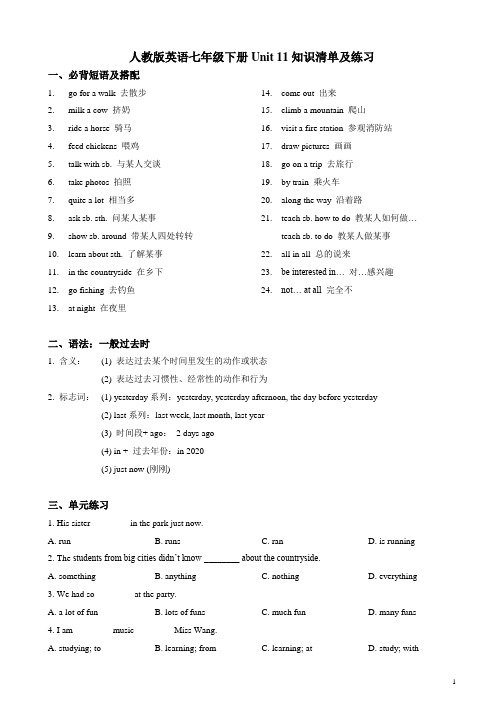
人教版英语七年级下册Unit 11知识清单及练习一、必背短语及搭配1.go for a walk 去散步k a cow 挤奶3.ride a horse 骑马4.feed chickens 喂鸡5.talk with sb. 与某人交谈6.take photos 拍照7.quite a lot 相当多8.ask sb. sth. 问某人某事9.show sb. around 带某人四处转转10.learn about sth. 了解某事11.in the countryside 在乡下12.go fishing 去钓鱼13.at night 在夜里e out 出来15.climb a mountain 爬山16.visit a fire station 参观消防站17.draw pictures 画画18.go on a trip 去旅行19.by train 乘火车20.along the way 沿着路21.teach sb. how to do 教某人如何做…teach sb. to do 教某人做某事22.all in all 总的说来23.be interested in… 对…感兴趣24.not… at all 完全不二、语法:一般过去时1. 含义:(1) 表达过去某个时间里发生的动作或状态(2) 表达过去习惯性、经常性的动作和行为2. 标志词:(1) yesterday系列:yesterday, yesterday afternoon, the day before yesterday(2) last系列:last week, last month, last year(3) 时间段+ ago:2 days ago(4) in + 过去年份:in 2020(5) just now (刚刚)三、单元练习1. His sister ________ in the park just now.A. runB. runsC. ranD. is running2. The students from big cities didn’t know ________ about the countryside.A. somethingB. anythingC. nothingD. everything3. We had so ________ at the party.A. a lot of funB. lots of funsC. much funD. many funs4. I am ________ music ________ Miss Wang.A. studying; toB. learning; fromC. learning; atD. study; with5. When my parents ________ young, there ________ not so much food.A. are; isB. were; wasC. are; wasD. were; is6. — I called you yesterday evening, but you were not in. — Sorry, I ________ in the shop with my mother.A. amB. will beC. wasD. were7. —Look! What’s on the floor?—Oh, it’s my bag. Please ________ for me.A. pick up itB. pick it upC. pick it outD. pick out it8. At about two o’clock yesterday, it ________ very cloudy and we ________ it would rain.A. gets; worriedB. got; worriedC. gets; worryD. got; worry9. — What do you want to be ________? — An English teacher.A. in the futureB. on the futureC. in futureD. at the future10. — Was there ________ when you went out with Tony? — No. I think everything was boring.A. interesting anythingB. somebody interestingC. interesting somethingD. anything interesting11. What did you do ________ your school trip?A. onB. atC. inD. with12. —It’s important for us to know ________ all the subjects.— Yeah, group work is my favorite.A. how to studyB. when to studyC. which to studyD. what to study13. After lunch they ________ to the fruit shop where they ________ some apples and bananas.A. go; boughtB. goes; buyC. went; buyD. went; bought14. He was not at home ________.A. last nightB. tomorrowC. nowD. today15. — Hi, Diana. How was your summer holiday? — ________! I enjoyed myself by the sea very much.A. Good ideaB. Wait a minuteC. That’s too badD. Pretty good16. Lucy is ________ girl. Everyone likes her very much.A. a quite beautifulB. quite beautiful aC. quite a beautifulD. beautiful quite a17. Gina played ping-pong ________.A. next SundayB. every eveningC. last weekendD. now18. She ________ that boy very much because he is a ________ boy.A. loves; lovelyB. loving; lovingC. lovely; lovedD. loved; loves19. —Don’t ________. We still have an hour to finish it.— OK.A. knowB. worryC. thinkD. say20. It ________ rainy yesterday, but it ________ sunny today.A. is; isB. was; wasC. is; wasD. was; is21. Listen! I hear someone ________ in the classroom.A. singB. singingC. to singD. sang22. He is ________ young to do the hard work.A. veryB. tooC. soD. quite23. The girl enjoys ________ the radio very much.A. listeningB. to listenC. listening toD. to listen to24. The teacher ________ me ________ this school yesterday.A. showed; aroundB. showed; atC. shows; aroundD. shows; at25. — What about going to the countryside for a trip? — ________A. it was excellent!B. Lucky you.C. Sounds great!D. Sure, I’d love to.26. It was ________ exciting race. And we all enjoyed it.A. theB. anC. /D. a27. Jack didn’t ________ at home yesterday morning.A. ate anythingB. eat anythingC. ate everythingD. eat everything28. Excuse me. I couldn’t ________ you. Could you say it again?A. findB. callC. seeD. hear29. This story is very ________, so we are all ________ in it.A. interesting; interestedB. interesting; interestingC. interested; interestingD. interested; interested30. — ________ was the book sale in your school library last Sunday? — Great.A. WhenB. HowC. WhereD. What31. My cousin ________ fishing every day when he was in the countryside last year.A. goesB. goC. wentD. is going32. This math problem is so difficult. I really don’t know ________.A. what doingB. what to do itC. how doingD. how to do it33. — Did he play basketball after school yesterday? — ________. He played soccer.A. Yes, he didB. No, he didn’tC. Yes, he doesD. No, he doesn’t34. This is a ________ train. It stops at a lot of places.A. quietB. slowC. scaryD. dirty35. What about going ________ with us?A. fishB. fishesC. fishedD. fishing36. It ________ rainy last Sunday, so Jim ________ TV at home.A. is; watchedB. was; watchedC. was; watchD. is; watch37. — Do you like Sanya? —Yeah. It’s ________ beautiful place.A. quite aB. a quiteC. quite anD. an quite38. Mike, can you show us ________ your school now?A. ofB. toC. aroundD. along39. — Excuse me, look at the sign (指示牌) “No Swimming”!— Sorry. I ________ it.A. sawB. seeC. didn’t seeD. don’t see40. — Were there any zoos in the village? — ________.A. Yes, there wasB. No, they weren’tC. No, I didn’tD. Yes, I do41. — Did you go to the movies last night? — ________.A. Yes, I wasB. Sorry, I can’tC. No, I didn’tD. Yes, I do42. Tom went into the room, took off his coat and ________ down on a sofa.A. would sitB. was sittingC. satD. had sat43. Mary ________ with her friends last Sunday night.A. took a walkB. take a restC. took outD. take pictures44. — When ________ your brother ________ back? — About half an hour ago.A. did; comeB. had; comeC. do; comeD. have; come45. The girl didn’t say ________ at the party.A. somethingB. anythingC. nothingD. everything46. The farmer ________ 100 apple trees last year.A. grewB. fedC. pickedD. farmed47. I got up late this morning. ________, Mr. Green gave me a ride to school.A. BadlyB. TerriblyC. ReallyD. Luckily48. My mother ________ back to Shanghai last Sunday.A. goesB. goC. goingD. went49. The speaker was too far from us and we couldn’t ________ him clearly.A. listenB. listen toC. hearD. hear to50. Don’t ride so ________ on the busy street.A. fastB. slowC. excitingD. excellent。
人教版英语七年级下册单元Unit 11 知识点+测试卷+思维导图
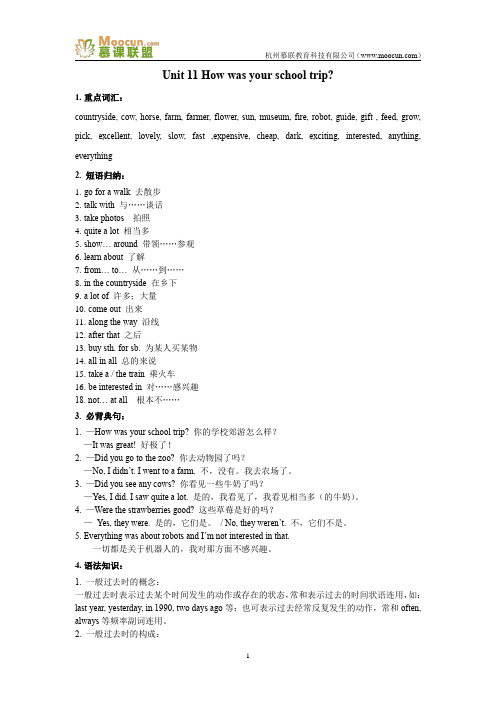
Unit 11 How was your school trip?1.重点词汇:countryside, cow, horse, farm, farmer, flower, sun, museum, fire, robot, guide, gift , feed, grow, pick, excellent, lovely, slow, fast ,expensive, cheap, dark, exciting, interested, anything, everything2. 短语归纳:1.go for a walk 去散步2.talk with 与……谈话3.take photos 拍照4.quite a lot 相当多5.show… around 带领……参观6.learn about 了解7.from… to… 从……到……8.in the countryside 在乡下9.a lot of 许多;大量e out 出来11.along the way 沿线12.after that 之后13.buy sth. for sb. 为某人买某物14.all in all 总的来说15.take a / the train 乘火车16.be interested in 对……感兴趣18. not… at all 根本不……3. 必背典句:1. —How was your school trip? 你的学校郊游怎么样?—It was great! 好极了!2. —Did you go to the zoo? 你去动物园了吗?—No, I didn’t. I went to a farm. 不,没有。
我去农场了。
3. —Did you see any cows? 你看见一些牛奶了吗?—Yes, I did. I saw quite a lot. 是的,我看见了,我看见相当多(的牛奶)。
4. —Were the strawberries good? 这些草莓是好的吗?—Yes, they were. 是的,它们是。
人教版七年级下册 Unit 11知识点总结

七年级下册Unit 11知识点总结第一部分:重点单词1. milk 不可数名词,“牛奶”动词,“挤奶”milk a cow 给奶牛挤奶2. farm 名词,“农场”动词,“务农;种田”farmer 农民3. quite 副词,“相当;完全”修饰形容词副词,quite a lot 相当多拼写注意与quiet(安静的)的区分4. grow “种植”grow strawberries 种草莓动词“生长;发育”grow up 长大“增加;增长”The number of students wearing glasses grows.戴眼镜的学生数量增加了。
5. pick 动词“采摘”pick apples 摘苹果“选择;挑选”pick up “捡起;接电话;接某人“6. worry 动词&名词,“担心;担忧“worry about … 担心… worry sb. 使某人担心7. luckily 副词,“幸运地“unluckily 不幸地lucky 幸运的(形容词)luck 幸运;运气(名词)8. exciting 形容词,“使人兴奋的;令人激动的“excited 感到激动的、兴奋的an exciting message 一个令人激动的消息He is excited to see his old friend.见到老朋友他很激动。
9. expensive 形容词,“昂贵的“cheap ”便宜的“10. slow 形容词,“缓慢的;迟缓的“slowly 缓慢地(副词)fast快地(的)动词,“减慢“slow down 减速慢行11. guide 名词,“导游,向导“动词,“指导“guide sb. to do … 指导某人做某事12. interested 形容词,“感兴趣的“be interested in … 对…感兴趣interesting 有趣的This is an interesting book. 这是一本有趣的书。
Unit11单元知识点归纳总结及配套练习-人教版英语七年级下册

Unit11 How was your school trip?Ⅰ. Revision(复习)Ⅱ. Presentation(重点,难点,考点,热点呈现)一般过去式1. 含义:表示动作或者状态发生在过去2.构成:肯定句:主语+动词过去式+ 其它如:I went home at nine o'clock yesterday.否定句:主语+didn't +动词原形+其它如:I didn't go home yesterday. He didn't tell me about you.疑问句:一般疑问句:Did +主语+动词原形+宾语如:Did you go home yesterday?Did you study in the school?肯定回答:Yes, I did. 否定回答:No, I didn't.特殊疑问句:特殊疑问词+did +主语+动词原型+宾语When did you finish your homework last night? What did you do the day before yesterday?3. 一般过去时态动词变化形式一般过去时态由动词的过去式表示。
大多数动词的过去式是在动词原形后加上ed构成。
这类动词称为规则动词。
1)一般情况下在词尾直接加ed。
如:play―played work―worked2)以e结尾的动词只加d. 如:like--- liked love―loved3)以辅音字母+Y结尾的动词,变Y为i,再加ed. 如:study―studied carry―carried 4)以重读闭音节结尾的动词,如果末尾只有一个辅音字母,要双写最后这个辅音字母,再加ed.如:stop―stopped5)不以ed 结尾的过去式,称为不规则动词,如:write --wrote go-went do-did have-had see-saw take-took make-made come-came buy-bought4. 标志词。
人教版七年级下册 Unit 11知识点总结+练习(无答案)

一.本节知识一.单词听写挤奶v. ______奶牛n._____马n. _______喂养v.______农民n._____相当adv._____任何东西pron.____种植;生长v._____农场n._____采;摘v._____极好的adj._____农村n._____昨天n._____花n._____担心v.____幸运地adv.____ adj.___ n. ____太阳n.____二.重点短语1.给奶牛挤奶_____________2.骑马_______________3.喂小鸡____________________4.和农民交谈__________________5.照相______________6.带某人参观_____________7.种苹果___________________8.摘草莓________________9.去钓鱼__________________10.带领某人逛某地__________________11. go for a walk _______12. 和农民交谈_______13. 学习关于_____14. take them home _____15. in the countryside _____16. 在晚上看星星______17.Lucky you _______18. quite a lot _______19. have so much fun _____20 .come out ________三.知识梳理(知识点自己扣空)1. I saw quite a lot.quite adv. 相当;完全;十分;很例如:She sings quite well. 她唱得非常好。
quiet a lot 相当多+of+可数或不可数, 也可以单独使用。
quite a little 相当多+不可数名词quite a few 相当多+可数名词e.g. We drank quite a lot of wine.I saw quite a lot of cows.I play tennis quite a lot in the summer.Quite a few students were late.练习:1)We learned ________from the farmer.A. manyB. lotC. a lot D a. lot of2)We saw ________last month.A quite an exciting film Bquite film an excitingC very an exciting filmD a film very exciting3) We saw ____________ (相当多的奶牛) on the farm last Monday.2. How was your school trip?How + be + 主语?= What be +主语+ like? 意为“….怎么样?”本句的答语:It was great.It was OK.It was /wasn’t good….练习:-How______your trip to Nanjing?-Great. I ____a great time there.A was,hadB were,have Cwas, have Dwere,had3. It was so much fun. 那真是蛮好玩的。
人教版七年级下册unit 11单元考点归纳
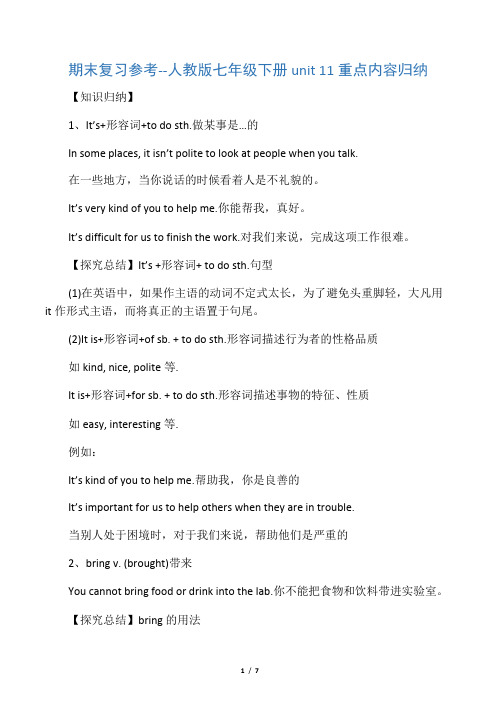
期末复习参考--人教版七年级下册unit 11重点内容归纳【知识归纳】1、It’s+形容词+to do sth.做某事是…的In some places, it isn’t polite to look at people when you talk.在一些地方,当你说话的时候看着人是不礼貌的。
It’s very kind of you to help me.你能帮我,真好。
It’s difficult for us to finish the work.对我们来说,完成这项工作很难。
【探究总结】It’s +形容词+ to do sth.句型(1)在英语中,如果作主语的动词不定式太长,为了避免头重脚轻,大凡用it作形式主语,而将真正的主语置于句尾。
(2)It is+形容词+of sb. + to do sth.形容词描述行为者的性格品质如kind, nice, polite等.It is+形容词+for sb. + to do sth.形容词描述事物的特征、性质如easy, interesting等.例如:It’s kind of you to help me.帮助我,你是良善的It’s important for us to help others when they are in trouble.当别人处于困境时,对于我们来说,帮助他们是严重的2、bring v. (brought)带来You cannot bring food or drink into the lab.你不能把食物和饮料带进实验室。
【探究总结】bring的用法(1)bring作动词用,意为“带来”,其过去式为brought常构成短语:bring sb. sth. = bring sth. to sb.意为“给某人带来某物”bring up意为“养育”。
(2)bring, take, carry与get的用法辨析:bring表示从别处把某人或物“带来”或“拿来”take指把某人或物“带走”或“拿走”(到别处)carry指“搬运”,不详尽说明来去的方向,有时含有惨重或麻烦之意get指到别处把某物取来,相当于go and bring3、each pron.各个,每个In the US some people shake hands, and some kiss or hug each other.在美国,有些人握手,有些人亲吻或彼此拥抱。
七级下册 Unit 11 知识点复习总结与测试题
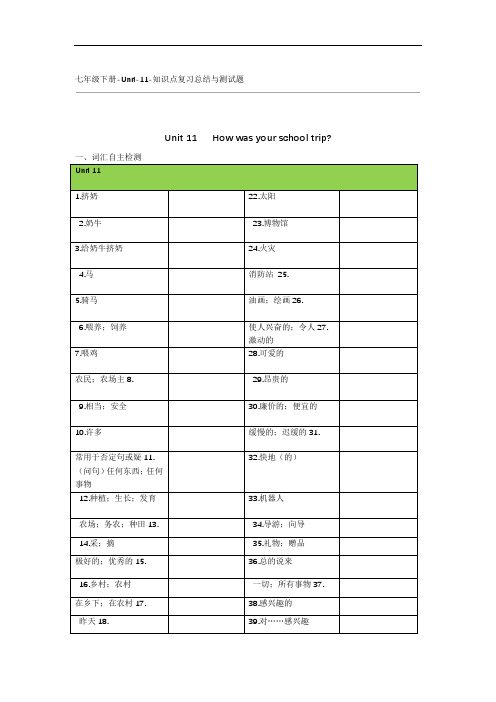
七年级下册-Unit-11-知识点复习总结与测试题Unit 11 How was your school trip?一、词汇自主检测6/ 1七年级下册-Unit-11-知识点复习总结与测试题二、知识点总结主要语法:一般过去时表示在过去某个时间所发生的动作或所处的状态(与现在无关)。
常与yesterday, last week, in 1989, just now, a moment ago, the other day等过去具体时间状语连用。
He was here just now.他刚才还在这里。
What did you do yesterday?你昨天做了什么事?一般过去时基本结构1. 肯定句形式:主语+动词过去式+其他I was an English teacher one year ago.一年前我是一名英语老师。
I bought a yellow dress yesterday afternoon.昨天下午我买了一条黄裙子。
2. 否定句形式:①was/were+not;②在行为动词前加didn't,同时还原行为动词I wasn't an English teacher one year ago.一年前我不是一名英语老师。
I didn't buy a yellow dress yesterday afternoon.昨天下午我没买一条黄裙子。
3. 一般疑问句:①was/were提到句首;②Did+主语+动词原形+其他?Were you an English teacher one year ago?一年前你是一名英语老师吗?Did you buy a yellow dress yesterday afternoon?昨天下午你买了一条黄裙子吗?4. 特殊疑问句:特殊疑问词+一般疑问句What were you one year ago?一年前你是做什么的?5. 动词过去式规则变化:一般情况,直接加ed;以不发音e结尾的单词,直接加d;以辅音字母+y结尾的,变y为i加ed;以元音字母+y结尾的,直接加ed;以重读闭音节结尾的,双写最后的辅音字母+ed 不规则变化的动词过去式(见书本最后一页)6/ 2七年级下册-Unit-11-知识点复习总结与测试题6/ 3七年级下册-Unit-11-知识点复习总结与测试题必备短语:1. go for a walk 去散步2. milk a cow 挤牛奶I milked a cow.3. ride a horse 骑马4. feed chickens 喂小鸡5. talk with 与……谈话He talked with a farmer.6. take photos 拍照7. quite a lot 相当多q uite a lot of…很多的……8. show…around 带领……参观The farmer showed him around the farm.9. learn about 了解……At the museum, I learned a lot about robots. 在博物馆里,我了解到了很多关于机器人的知识。
人教版初一七年级英语(下)第十一单元Unit11知识点、语法+练习题、测试
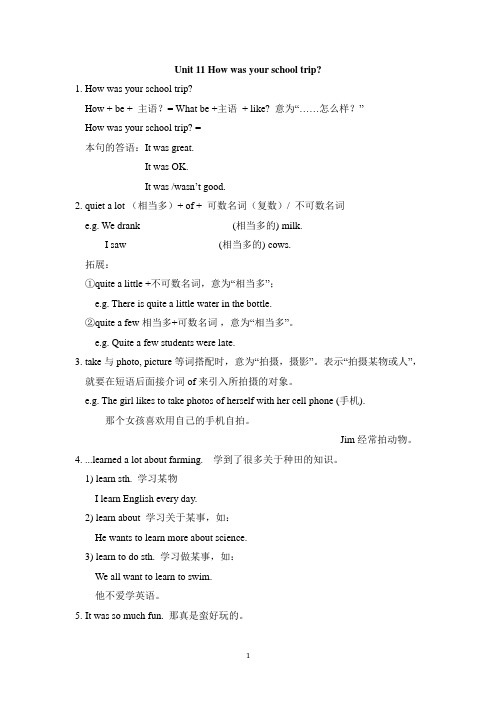
Unit 11 How was your school trip?1. How was your school trip?How + be + 主语?= What be +主语+ like? 意为“……怎么样?”How was your school trip? = __________________________________本句的答语:It was great. _________________It was OK. _________________It was /wasn’t good. _________________2. quiet a lot (相当多)+ of + 可数名词(复数)/ 不可数名词e.g. We drank __________________(相当多的) milk.I saw __________________(相当多的) cows.拓展:①quite a little +不可数名词,意为“相当多”;e.g. There is quite a little water in the bottle.②quite a few 相当多+可数名词,意为“相当多”。
e.g. Quite a few students were late.3. take与photo, picture等词搭配时,意为“拍摄,摄影”。
表示“拍摄某物或人”,就要在短语后面接介词of来引入所拍摄的对象。
e.g. The girl likes to take photos of herself with her cell phone (手机).那个女孩喜欢用自己的手机自拍。
______________________________________________ Jim经常拍动物。
4. ...learned a lot about farming. 学到了很多关于种田的知识。
1) learn sth. 学习某物I learn English every day.2) learn about 学习关于某事,如:He wants to learn more about science.3) learn to do sth. 学习做某事,如:We all want to learn to swim.他不爱学英语。
人教版英语七年级下册Unit 11 单元知识点
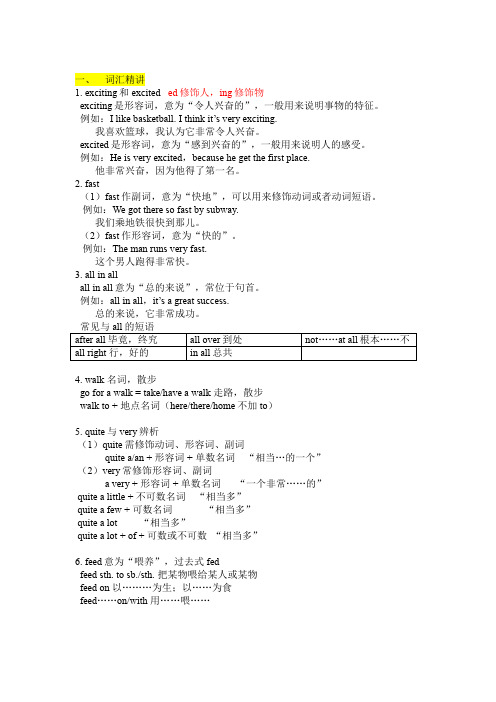
一、词汇精讲1. exciting和excited ed修饰人,ing修饰物exciting是形容词,意为“令人兴奋的”,一般用来说明事物的特征。
例如:I like basketball. I think it’s very exciting.我喜欢篮球,我认为它非常令人兴奋。
excited是形容词,意为“感到兴奋的”,一般用来说明人的感受。
例如:He is very excited,because he get the first place.他非常兴奋,因为他得了第一名。
2. fast(1)fast作副词,意为“快地”,可以用来修饰动词或者动词短语。
例如:We got there so fast by subway.我们乘地铁很快到那儿。
(2)fast作形容词,意为“快的”。
例如:The man runs very fast.这个男人跑得非常快。
3. all in allall in all意为“总的来说”,常位于句首。
例如:all in all,it’s a great success.总的来说,它非常成功。
4. walk 名词,散步go for a walk = take/have a walk 走路,散步walk to + 地点名词(here/there/home不加to)5. quite与very辨析(1)quite需修饰动词、形容词、副词quite a/an + 形容词 + 单数名词“相当…的一个”(2)very常修饰形容词、副词a very + 形容词 + 单数名词“一个非常……的”quite a little + 不可数名词“相当多”quite a few + 可数名词“相当多”quite a lot “相当多”quite a lot + of + 可数或不可数“相当多”6. feed意为“喂养”,过去式fedfeed sth. to sb./sth. 把某物喂给某人或某物feed on 以………为生;以……为食feed……on/with 用……喂……7. How + be + 事物名词的用法?how意为如何,怎样●身体情况 How is your grandmother?●方式、方法 How did you come back home last night?●天气情况 How is the weather in Shanghai today?●程度 How do you like the book?8. show作动词,展示;show sth. to sb. = show sb. sth. 给某人展示某物作名词,节目;TV show电视节目;talk show访谈节目9. anything 任何东西;任何事物;常用于否定句或疑问句●anything作主语时,谓语动词用单数形式●形容词修饰不定代词something,anything时,形容词后置●something常用于肯定句中,但表示请求、建议、征求意见等,希望得到肯定回答的疑问句中常用something。
人教版七年级下册英语Unit 11 How was your school trip? 知识点总结
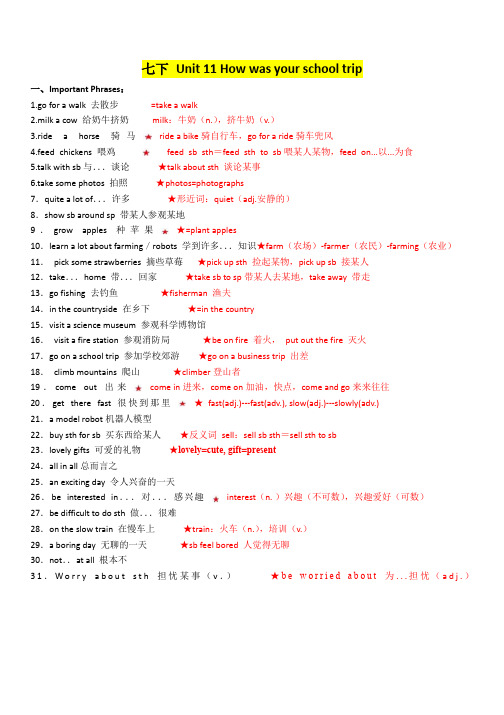
七下Unit 11 How was your school trip一、Important Phrases:1.go for a walk 去散步=take a walkk a cow 给奶牛挤奶milk:牛奶(n.),挤牛奶(v.)3.ride a horse 骑马ride a bike骑自行车,go for a ride骑车兜风4.feed chickens 喂鸡feed sb sth=feed sth to sb喂某人某物,feed on...以...为食5.talk with sb与...谈论★talk about sth 谈论某事6.take some photos 拍照★photos=photographs7.quite a lot of...许多★形近词:quiet(adj.安静的)8.show sb around sp 带某人参观某地9.grow apples种苹果★=plant apples10.learn a lot about farming/robots 学到许多...知识★farm(农场)-farmer(农民)-farming(农业)11.pick some strawberries 摘些草莓★pick up sth 捡起某物,pick up sb 接某人12.take...home 带...回家★take sb to sp带某人去某地,take away 带走13.go fishing 去钓鱼★fisherman 渔夫14.in the countryside 在乡下★=in the country15.visit a science museum 参观科学博物馆16.visit a fire station 参观消防局★be on fire 着火,put out the fire 灭火17.go on a school trip 参加学校郊游★go on a business trip 出差18.climb mountains 爬山★climber登山者19.come out 出来c ome in进来,come on加油,快点,come and go来来往往20.get there fast 很快到那里★fast(adj.)---fast(adv.), slow(adj.)---slowly(adv.)21.a model robot机器人模型22.buy sth for sb 买东西给某人★反义词sell:sell sb sth=sell sth to sb23.lovely gifts 可爱的礼物★lovely=cute, gift=present24.all in all总而言之25.an exciting day 令人兴奋的一天26.be interested in...对...感兴趣interest(n.)兴趣(不可数),兴趣爱好(可数)27.be difficult to do sth 做...很难28.on the slow train 在慢车上★train:火车(n.),培训(v.)29.a boring day 无聊的一天★sb feel bored 人觉得无聊30.not..at all 根本不31.W o r r y a b o u t s t h担忧某事(v.)★b e w o r r i e d a b o u t为...担忧(a d j.)二、Key Language Points:1.---How was your school trip?=How did you feel about the trip?你的学校郊游怎么样?---It was great/excellent/terrible.很棒. ★be excellent in...在某方面极出色How+be+sth?=What+be+sth+like?询问某事情况怎么样。
人教版七年级英语下册Unit11知识点及练习
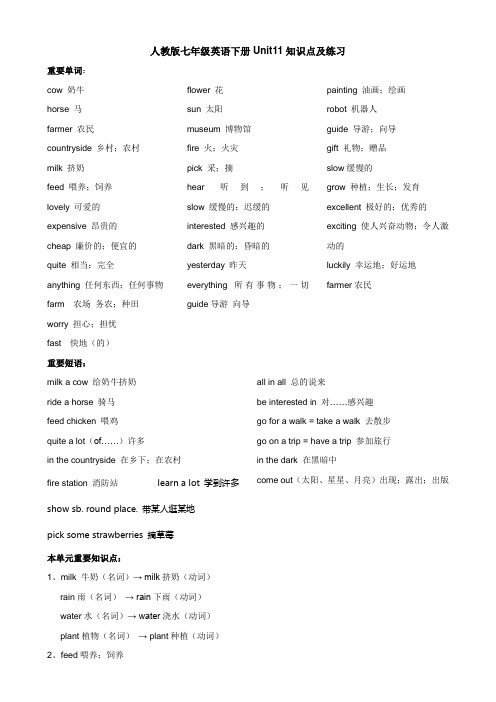
人教版七年级英语下册Unit11知识点及练习重要单词:cow 奶牛horse 马farmer 农民countryside 乡村;农村flower 花sun 太阳museum 博物馆fire 火;火灾painting 油画;绘画robot 机器人guide 导游;向导gift 礼物;赠品milk 挤奶feed 喂养;饲养pick 采;摘hear 听到;听见slow缓慢的grow 种植;生长;发育lovely 可爱的expensive 昂贵的cheap 廉价的;便宜的slow 缓慢的;迟缓的interested 感兴趣的dark 黑暗的;昏暗的excellent 极好的;优秀的exciting 使人兴奋动物;令人激动的quite 相当;完全yesterday 昨天luckily 幸运地;好运地anything 任何东西;任何事物everything 所有事物;一切farmer农民farm 农场务农;种田worry 担心;担忧fast 快地(的)guide导游向导重要短语:milk a cow 给奶牛挤奶ride a horse 骑马feed chicken 喂鸡quite a lot(of……)许多in the countryside 在乡下;在农村fire station 消防站learn a lot 学到许多show sb. round place. 带某人逛某地pick some strawberries 摘草莓all in all 总的说来be interested in 对……感兴趣go for a walk = take a walk 去散步go on a trip = have a trip 参加旅行in the dark 在黑暗中come out(太阳、星星、月亮)出现;露出;出版本单元重要知识点:1、milk 牛奶(名词)→ milk挤奶(动词)rain雨(名词)→ rain下雨(动词)water水(名词)→ water浇水(动词)plant植物(名词)→ plant种植(动词)2、feed喂养;饲养Can you help me feed my dog?你能帮我喂狗吗?(1)feed……to…… 把……喂给……You can feed nuts to the monkey. 你可以把坚果喂给这个猴子吃。
人教版初中英语7年级下册unit11知识清单+习题 (附解答)

七下Unit 11 How was your school trip?一、必会单词:milk v挤奶cow n 奶牛feed v喂养;饲养farmer n.农民;农场主quite adv相当;完全anything pron任何东西;任何事物grow v种植;生长;发育excellent adj极好的;优秀的pick v采;摘countryside n乡村;农村worry v &n担心;担忧luckily adv幸运地;好运地museum n博物馆painting n 油画,绘画exciting adj.使人兴奋的;令人激动的lovely adj可爱的cheap adj.廉价的;便宜的expensive adj.昂贵的slow adj缓慢的;迟缓的fast adv&adj.快地(的)robot n 机器人guide n 导游,向导gift n 礼物,赠品everything pron.所有事物;一切interested adj.感兴趣的dark adj.黑暗的;昏暗的hear v听到;听见二、常考短语:go for a walk去散步milk a cow给奶牛挤奶ride a horse骑马feed chickens 喂鸡talk with与…谈话take photos拍照quite a lot(of)许多show. ..around 带领…参观learn about了解from...to…从…到…grow strawberries种植草莓pick strawberries摘草莓in the countryside在乡下;在农村go fishing去钓鱼at night在夜晚come out出来fire station 消防站go on a school trip参加学校郊游along the way沿途after that之后all in all总的说来take a/ the train乘火车be interested in对……感兴趣not…at all根本不……How be..?…怎么样?How do/does+主语+ feel about….? …对…感觉如何?too many+可数名词复数太多….teach sb. how to do sth.教某人怎样做某事quite a/an+形容词+可数名词单数=a very+形容词+可数名词单数相当/非常…buy sth. for sb.=buy sb.sth.为某人买某物It’s+形容词+ to do sth.做某事是……的。
人教版七年级下unit11知识点和练习无答案
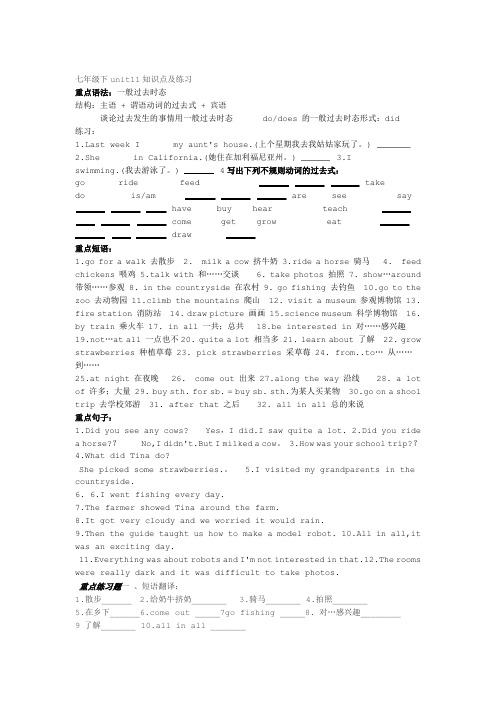
七年级下unit11知识点及练习重点语法:一般过去时态结构:主语 + 谓语动词的过去式 + 宾语谈论过去发生的事情用一般过去时态 do/does 的一般过去时态形式:did练习:st week I my aunt's house.(上个星期我去我姑姑家玩了。
)2.She in California.(她住在加利福尼亚州。
)3.Iswimming.(我去游泳了。
) 4写出下列不规则动词的过去式:go ride feed takedo is/am are see say have buy hear teachcome get grow eatdraw重点短语:1.go for a walk 去散步2. milk a cow 挤牛奶3.ride a horse 骑马4. feedchickens 喂鸡 5.talk with 和……交谈 6. take photos 拍照 7. show…around带领……参观 8. in the countryside 在农村 9. go fishing 去钓鱼 10.go to thezoo 去动物园 11.climb the mountains 爬山 12. visit a museum 参观博物馆 13.fire station 消防站 14. draw picture 画画 15.science museum 科学博物馆 16.by train 乘火车 17. in all 一共;总共 18.be interested in 对……感兴趣19.not…at all 一点也不20. quite a lot 相当多 21. learn about 了解 22. growstrawberries 种植草莓 23. pick strawberries 采草莓 24. from..to…从……到……25.at night 在夜晚 26. come out 出来 27.along the way 沿线 28. a lotof 许多;大量 29. buy sth. for sb. = buy sb. sth.为某人买某物 30.go on a shooltrip 去学校郊游 31. after that 之后 32. all in all 总的来说重点句子:1.Did you see any cows? Yes,I did.I saw quite a lot.2.Did you ridea horse?? No,I didn't.But I milked a cow。
人教版英语七年级下册单元Unit 11 知识点+测试卷+思维导图

Unit 11 How was your school trip?1.重点词汇:countryside, cow, horse, farm, farmer, flower, sun, museum, fire, robot, guide, gift , feed, grow, pick, excellent, lovely, slow, fast ,expensive, cheap, dark, exciting, interested, anything, everything2. 短语归纳:1.go for a walk 去散步2.talk with 与……谈话3.take photos 拍照4.quite a lot 相当多5.show… around 带领……参观6.learn about 了解7.from… to… 从……到……8.in the countryside 在乡下9.a lot of 许多;大量e out 出来11.along the way 沿线12.after that 之后13.buy sth. for sb. 为某人买某物14.all in all 总的来说15.take a / the train 乘火车16.be interested in 对……感兴趣18. not… at all 根本不……3. 必背典句:1. —How was your school trip? 你的学校郊游怎么样?—It was great! 好极了!2. —Did you go to the zoo? 你去动物园了吗?—No, I didn’t. I went to a farm. 不,没有。
我去农场了。
3. —Did you see any cows? 你看见一些牛奶了吗?—Yes, I did. I saw quite a lot. 是的,我看见了,我看见相当多(的牛奶)。
4. —Were the strawberries good? 这些草莓是好的吗?—Yes, they were. 是的,它们是。
人教版七年级英语下册-Unit11:知识点总结 单元测试(word版,含答案)
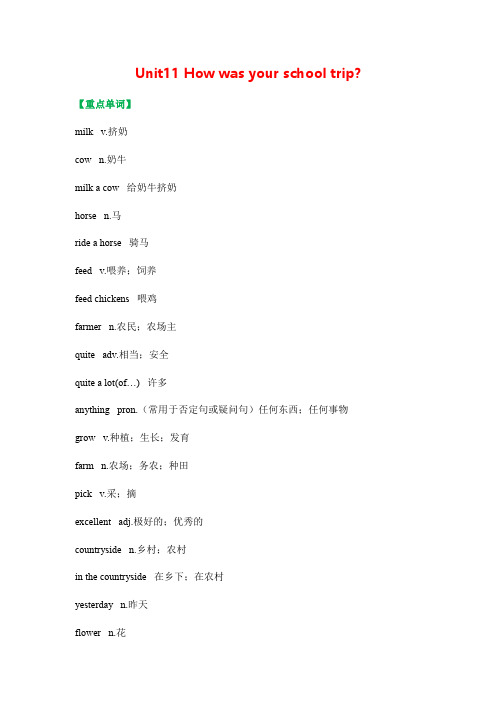
Unit11 How was your school trip? 【重点单词】milk v.挤奶cow n.奶牛milk a cow 给奶牛挤奶horse n.马ride a horse 骑马feed v.喂养;饲养feed chickens 喂鸡farmer n.农民;农场主quite adv.相当;安全quite a lot(of…) 许多anything pron.(常用于否定句或疑问句)任何东西;任何事物grow v.种植;生长;发育farm n.农场;务农;种田pick v.采;摘excellent adj.极好的;优秀的countryside n.乡村;农村in the countryside 在乡下;在农村yesterday n.昨天flower n.花worry v.担心;担忧luckily adv.幸运地;好运地sun n.太阳museum n.博物馆fire n.火灾fire station 消防站painting n.油画;绘画exciting adj.使人兴奋的;令人激动的lovely adj.可爱的expensive adj.昂贵的cheap adj.廉价的;便宜的slow adj.缓慢的;迟缓的fast adv&adj快地(的)robot n.机器人guide n.导游;向导gift n.礼物;赠品all in all 总的说来everything pron.一切;所有事物interested adj.感兴趣的be interested in 对……感兴趣dark adj.黑暗的;昏暗的hear(heard)v.听到;听见【重点短语】1. school trip 学校旅行2. go for a walk 去散步3. milk a cow 挤牛奶4. ride a horse 骑马5. feed chickens 喂鸡6. talk with a farmer 与农民交谈7. take some photos 照相8. ask some questions 问一些问题9. grow apples 种苹果10. show sb. around splace. 带某人逛某地11. learn a lot 学到许多12. pick some strawberries 摘草莓13. last week 上周14.In the countryside 在乡村15. visit my grandparents 拜访我的祖父母16. go fishing 去钓鱼17. sound good 听起来很好18. climb the mountains 去爬山19. play some games 玩一些游戏20. visit a museum 参观博物馆21. visit a fire station 参观消防站22.draw pictures 画画23. go on a school trip 去旅行24 visit the science museum 参观科技博物馆25. how to make a model robot如何制作机器人模型26. gift shop 礼品店27. buy sth for sb. 为某人买某物28. all in all 总得来说29. be interested in... 对…感兴趣30. be expensive 昂贵的31. not...at all 一点儿也不【重点句型】1.—Did you see any cows?你见到奶牛了吗一Yes, I did. I saw quite a lot.我见到了而且见到了很多很多2.—Did Carol take any photos?罗尔拍照片了吗?—Yes, she did.是的,她拍了。
- 1、下载文档前请自行甄别文档内容的完整性,平台不提供额外的编辑、内容补充、找答案等附加服务。
- 2、"仅部分预览"的文档,不可在线预览部分如存在完整性等问题,可反馈申请退款(可完整预览的文档不适用该条件!)。
- 3、如文档侵犯您的权益,请联系客服反馈,我们会尽快为您处理(人工客服工作时间:9:00-18:30)。
Unit11 How was your school trip?
知识点归纳及测试
【重点短语】
1. school trip 学校旅行
2. go for a walk 去散步
3. milk a cow 挤牛奶
4. ride a horse 骑马
5. feed chickens 喂鸡
6. talk with a farmer 与农民交谈
7. take some photos 照相
8. ask some questions 问一些问题
9. grow apples 种苹果
10. show sb. around sp . 带某人参观某地
11. learn a lot about sth 学到关于…的很多知识
12. pick some strawberries 摘草莓
13. take sth home 带某物回家
st week 上周
15.In the countryside 在乡村
16. visit my grandparents 拜访我的祖父母
17. go fishing 去钓鱼
18. sound good 听起来很好
19. quite a lot 相当多
20.climb the mountains 去爬山
21.. play some games 玩一些游戏
e out 出来
23.visit a museum 参观博物馆
24. visit a fire station 参观消防站
25.draw pictures 画画
26. go on a school trip 去旅行
27. visit the science museum 参观科技博物馆
28. along the way 沿路
29.how to make a model robot 如何制作机器人模型
30.teach sb to do sth 教某人做某事
31. gift shop 礼品店
32. buy sth for sb. 为某人买某物
33.on the slow train 坐慢火车
34.be interested in... 对…感兴趣
35. not...at all 一点儿也不
36. all in all 总得来说
【重点句型】
—Yes, she did.是的,她拍了。
3.—Hi, Eric, your trip last week?你好,Eric,上周旅游怎么样?一It was . I in the countryside.
精彩极了,我还去乡下看望了爷爷奶奶。
4.We so much fun! 我们玩得非常开心!
5.I a lot of great , too. 我也拍了好多精彩照片。
6. , it was an exciting day. 总之,这是令人兴奋的一天。
7. I’m not that. 我对此并不感兴趣。
【重点单词】
1. v.挤奶
2. n.奶牛
3. 给奶牛挤奶
4. n.马
5. 骑马
6. v.喂养;饲养
7. 喂鸡
8. n.农民;农场主
9. adv.相当;安全
10. 许多
11. pron.(常用于否定句或疑问句)任何东西;任何事物
12. v.种植;生长;发育
13. n.农场;务农;种田
14. v.采;摘
15. adj.极好的;优秀的
16. n.乡村;农村
17. 在乡下;在农村
18. n.昨天
19. n.花
20. v.担心;担忧
21. adv.幸运地;好运地
22. n.太阳
23. n.博物馆
24. n.火灾
25. 消防站
26. n.油画;绘画
27. adj.使人兴奋的;令人激动的
28. adj.可爱的
29. adj.昂贵的
30. adj.廉价的;便宜的
31. adj.缓慢的;迟缓的
32. adv&adj快地(的)
33. n.机器人
34. n.导游;向导
35. n.礼物;赠品
36. 总的说来
37. pron.一切;所有事物
38. adj.感兴趣的
39. 对……感兴趣
40. adj.黑暗的;昏暗的
41. v.听到;听见
重点解析
1. 一般过去时
基本结构:主语+动词过去式+其他;
否定形式:①was / were + not; ②在行为动词前加didn't,同时还原动词;
一般疑问句:①Was/Were+主语+其他?②Did+主语+动词原形+其他?
2. 动词过去式规则变化:直接加ed;以不发音e结尾的单词,直接加d;以辅音字母+y 结尾的,变y为i加ed;以元音字母+y结尾的,直接加ed;以重读闭音节结尾的,双写最后的辅音字母+ed
不规则变化的动词过去式
am/is--was是are--were是do--did做can--could能get--got得到feed--fed喂ride--rode骑buy--bought买teach--taught教grow-grew种draw-drew画swim--swam游泳see-saw看come--came来take--took拿走have--had有eat--ate吃go--went去
3. How was your school trip?= what was your school trip like?
4. buy/ get sb sth= buy/ get sth for sb
5.Something意为“某事,有些事”;
anything意为“任何事,任何东西”;
everything意为“每一件事”(其后的谓语动词要用单数)
nothing意为“没事,什么事都没有”。
5.否定转移(主语为第一人称I 或者we时)think,believe,suppose
2b课文译文
今天,我去郊游。
我们参观了科技博物馆而且它是真的有趣。
我们这么快就乘火车到那儿了。
路上,我们看到一些农场和村庄。
在博物馆,我们学到很多关于机器人的知识。
我原来就不知道他们能跟我们下棋。
好酷啊!然后导游教我们怎样去制作一个模型飞机。
我也拍了很多不错的照片。
之后,我买了一些可爱的礼物给父母。
他们不贵。
总而言之,它是一个令人兴奋的日子。
我认为今天的交友活动是糟糕透顶了。
我们乘火车去博物馆。
在慢火车上是如此热。
博物馆大而无聊的。
一切都是关于机器人的,我对那个不感兴趣。
房间里很暗,很难拍照,所以我没拍了几张。
有太多人而且我真的看不见或听不见导游。
商店里的东西是如此贵。
我根本不喜欢这趟旅行。
答案【重点句型】
1.Did,see,saw
2.Did,take
3.How was, excellent,visited my grandparents
4.had
5.took,photos
6. All in all
7.interested in
【重点单词】
k
2.cow
k a cow
4.horse
5.ride a horse
6.feed
7.feed chickens 8.farmer 9.quite 10.quite a lot(of…)
11.anything 12.grow 13.farm 14.pick 15.excellent 16.countryside 17.in the countryside 18.yesterday 19.flower 20.worry 21.luckily 22.sun 23.museum 24.fire
25.fire station 26.painting 27.exciting 28.lovely 29.expensive 30.cheap 31.slow 32.fast 33.robot 34.guide 35.gift
36.all in all 37.everything 38.interested 39.be interested in 40.dark 41.hear(heard)。
